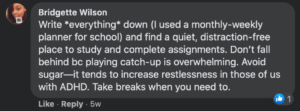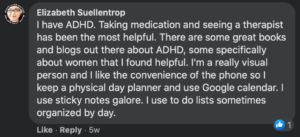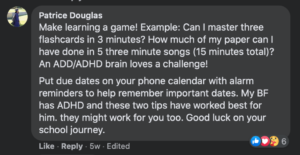ADHD, also known as Attention Deficit Hyperactivity Disorder, is an extremely common neurodevelopmental disorder that is typically diagnosed in childhood. However, ADHD can be diagnosed in adults, too. Because ADHD can make it hard to focus, it ca...
Read more
Tips for Managing ADHD in College
ADHD, also known as Attention Deficit Hyperactivity Disorder, is an extremely common neurodevelopmental disorder that is typically diagnosed in childhood. However, ADHD can be diagnosed in adults, too.
Because ADHD can make it hard to focus, it can have an impact on your college career. With so much of your day-to-day schedule determined by you, you want access to the best tools for success.
Want to know how you can improve your college performance with ADHD? In the Back to School Divas Facebook group, members had a few helpful tips to share!


![]()
![]() Medication
Medication
A specialist may prescribe you medication to manage your symptoms. Depending on your situation, you may either be prescribed stimulants, which are fast-acting and highly effective, or non-stimulants, which are not as potent but have longer lasting effects.


Bullet Journaling and Planners
Keeping journals, planners and diaries are a great way to keep track of your schedule and keep yourself accountable. It is especially helpful to students, who need to constantly keep track of various exams, projects and presentations that are coming up. It can help you focus on the most important tasks before tackling smaller, more tedious tasks. Since ADHD tends to cause a short attention span and difficulty learning, writing down thoughts, ideas and lists – even on your mobile device – can be an effective way to increase your productivity.
Looking to invest in a planner or journal? Click here to check out some of the best options available online today!


Physical Activity & Self-Care
Exerting some of your extra energy can be a great way to tire your brain, allowing you to practice your focusing techniques. College students especially are prone to long hours of physical inactivity, causing stress, boredom and a feeling or restlessness. Exercises such as running, swimming, and biking are all great options for breaking a sweat. If you are looking for a more calming activity that can also help you improve your mood, you can try yoga or meditation.
Check out this article to learn some of the best exercises to help combat the effects of ADHD!

See a Therapist
There is absolutely no shame in getting help when you need it! Seeing a therapist and speaking to them about your symptoms and coping mechanisms can help you vent your frustrations and improve your mindset.


Know Your Limits
Everyone is different so comparing your form of ADHD with someone else’s is a losing battle. If you’re struggling to keep up with schoolwork, consider asking for extra help outside of class hours or decrease the number of classes you have in general. Learn to take breaks when you need it, as being well rested will undoubtedly help you with your focus. Be kind to yourself and forgive the mistakes you make along the way.
There are many ways to help relieve the stress and anxiety that come with an ADHD diagnosis. Living with this disorder is totally doable and, although college can seem daunting and difficult, you can experiment with all the suggestions above, until you find something that works for YOU!



